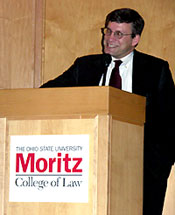
 Three cheers for the 527s
Three cheers for the 527s
Gregory Fossedal
August 17, 2004
Copyright © United Press
International
WASHINGTON, DC -- Warning: There's a new consensus among the political chattering class. Time for Americans to move our conventional wisdom alert level up to a very reddish orange.
The chairmen of both major political parties; President Bush; Senators Kerry and McCain; and journalists from Chris Matthews to David Broder are all generally agreed: The independent "527" committees, which have been airing ads beyond the control of professional office-seekers, and issues deemed unrespectable by the mainstream press, are a bad thing. They should be regulated, ignored, or, at best, drummed off the political stage.
When this many aristocrats agree that something is undermining democracy, there must be some good in it. The last time America's political cogniscenti were in this kind of unison, they were busily agreeing that California's gubernetorial recall election was a dangerous and ridiculous exercise.
By way of background, the 527 committees are those independent groups that have been publishing books, making protests, and above all, airing television and radio commercials, on political issues throughout 2003 and 2004. On one side, salient examples include Moveon.org and the Media Fund, which have been attacking President Bush's policies -- and, really, his personal honesty and competence -- for more than a year. On the other, such groups as SwiftBoat Veterans for Truth have questioned Senator Kerry's service record.

Give that man an award: Bradley Smith and the FEC have defended the free speech rights of Americans where they count the most, in political debate, with courage, patience, and grace. |
Gregory Fossedal is a senior fellow at the Alexis de Tocqueville Institution and the author of "Direct Democracy in Switzerland" and "The Democratic Imperative." His opinions are entirely his own and not necessarily those of UPI or AdTI.
|

 Three cheers for the 527s
Three cheers for the 527s